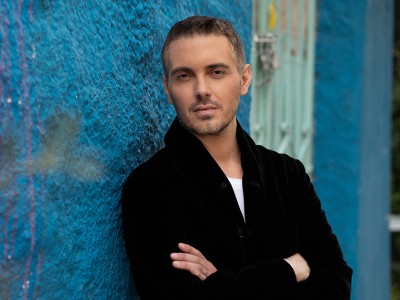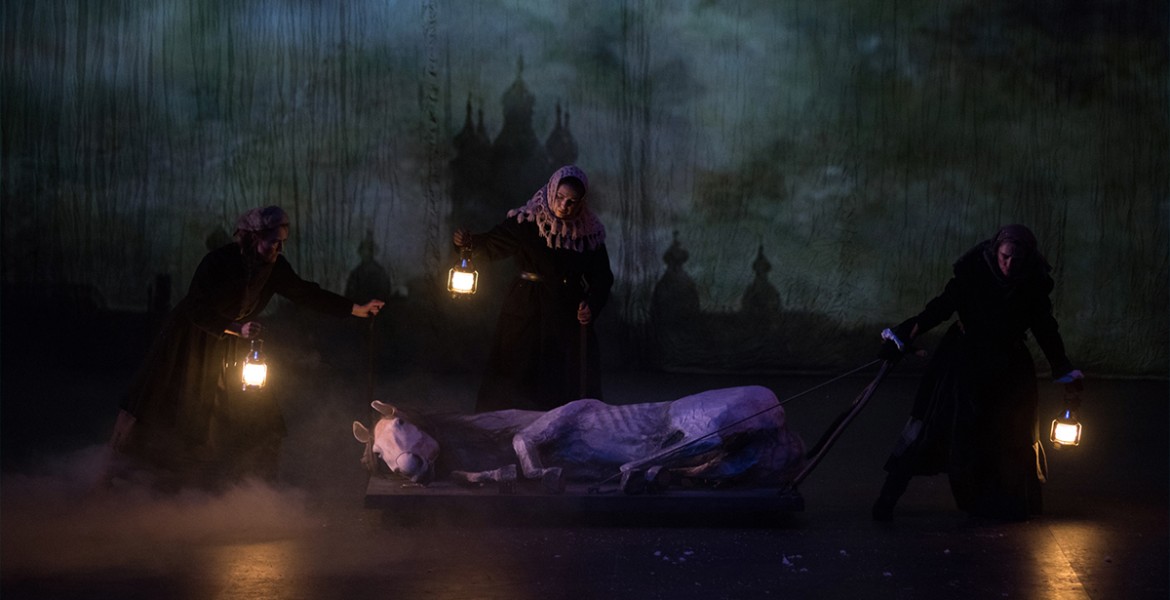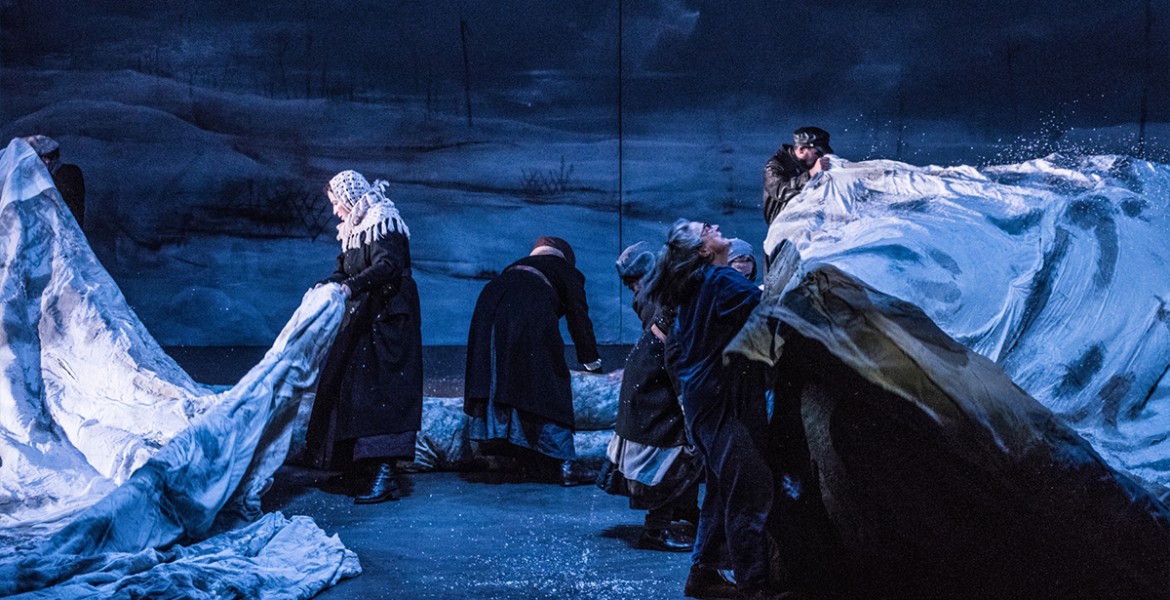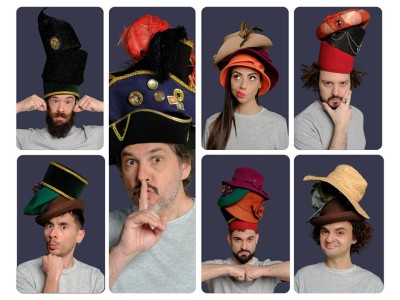Point Of View
Εδώ έχει δράκους / Hic sunt Dracones - Κριτική
Νάγια Παπαπάνου“The word is about, there's something evolving,
Whatever may come, the world keeps revolving...
They say the next big thing is here,
That the revolution's near,
But to me it seems quite clear
That's it's all just a little bit of history repeating.”₁
Το Θέατρο του Ήλιου και η Αριάν Μνουσκίν, φέρνουν στο μυαλό του κοινού συνειρμικά παραστάσεις και παραγωγές μεγάλης κλίμακας, σκηνικά και εφέ, πολυάριθμους συντελεστές και ερμηνευτές, θέματα ιστορικής προέλευσης και μια παιδαγωγική προσέγγιση. Η πρόσφατη παραγωγή «Εδώ έχει Δράκους, Επεισόδιο Πρώτο - 1917: Η Νίκη ήταν στα χέρια μας» αποτυπώνει πραγματικά και αναπόφευκτα όλα τα προαναφερθέντα στοιχεία αυτού του απίστευτου κεφαλαίου στη σύγχρονη ιστορία του θεάτρου που η Μνουσκίν και όλα τα μέλη του Θεάτρου του Ήλιου ξεκίνησαν να γράφουν το 1964 και δεν σταμάτησαν έκτοτε.
Η παράσταση που έκανε πρεμιέρα στο Παρίσι (Νοέμβριος 2024) κυριολεκτικά ξεκινά με τη ρωσική εισβολή στην Ουκρανία στις 24 Φεβρουαρίου 2022 και την ομιλία του Βλαντιμίρ Πούτιν. Στη συνέχεια, κάνουμε μια βουτιά στην Ιστορία και επιστρέφουμε στο 1916 για να συναντήσουμε τους πρωταγωνιστές της Ρωσικής Επανάστασης ή τις φωλιές των Δράκων όπου τα αυγά έχουν τοποθετηθεί προσεκτικά, διασκορπισμένα σε όλο τον κόσμο περιμένοντας την εκκόλαψη τους. Η παράσταση δίνει κοντινά πλάνα στις φιγούρες που διαμόρφωσαν το μέλλον του κόσμου όπως τον ξέρουμε σήμερα, και πιθανότατα να κινούν ακόμα τα νήματα ως Master Puppeteers. Φυσικά, οι φιγούρες της Ρωσικής Επανάστασης περιβάλλονται από τους υπόλοιπους Ευρωπαίους ηγέτες και ιστορικές προσωπικότητες όπως ο Ουίνστον Τσόρτσιλ, ο νονός του «Σιδηρούν Παραπετάσματος» και δύο πολύ νεαρά αλλά επικίνδυνα άτομα,τον Αδόλφο Χίτλερ και Τζόζεφ Γκέμπελς, καθώς βρισκόμαστε ακόμα στην εποχή του Μεγάλου Πολέμου ή αυτό που τώρα αποκαλούμε Α’ Παγκόσμιο Πόλεμο. Επιστολές, ομιλίες, πρακτικά συναντήσεων, παρασκηνιακές δολοπλοκίες και ανέκδοτες ιστορίες από την ζωή στο Πετρογκραντ (προσαρμογή του ονόματος της Αγίας Πετρούπολης το 1914), καθώς και μικρές φάρσες και οι διαβόητες τρεις μάγισσες του Σαίξπηρ περπατούν στην ιστορική λωρίδα που διαμόρφωσε και οδήγησε στην ίδρυση της Σοβιετικής Ένωσης.
Υπάρχει ένα ρητό που λέει ότι η Ιστορία γράφεται από τους Νικητές: σε αυτή την προοπτική, πόσες Ιστορίες υπάρχουν; Οι Σοβιετικοί θεωρούσαν τους εαυτούς τους νικητές, το ίδιο και οι Δυτικοί και υπήρχαν ηττημένοι και από τις δύο πλευρές, οι οποίοι μπορεί επίσης να θεωρούσαν τους εαυτούς τους νικητές. Ο Νέβιλ Τσάμπερλεν είχε δηλώσει ότι, “Στον πόλεμο, όποια πλευρά κι αν αυτοαποκαλείται νικήτρια, δεν υπάρχουν νικητές, αλλά όλοι είναι ηττημένοι”. Ποια είναι η προοπτική της θεατρικής παράστασης της Αριάν Μνουσκίν και Ελεν Σιξου; Ότι κάποιος κάπου εκκολάπτει τα αυγά των δράκων απειλώντας να θέσει σε κίνδυνο τον κόσμο; Ότι υπάρχουν δράκοι, γνωστοί και ως αχαρτογράφητοι κίνδυνοι σε μέρη που θεωρούσαμε ότι είχαμε ήδη επαληθεύσει ως ασφαλή; Ότι δεν ξέρουμε την ιστορία μας και είμαστε υποχρεωμένοι να επαναλάβουμε τα λάθη; Ποιος ήταν ο στόχος της δραματουργίας υπερφορτωμένης από πληροφορίες που έτειναν προς το να επηρεάσουν το κοινό για ποιο πράγμα ακριβώς, για την σχέση της Ρωσίας με την δημοκρατία; Η Ρωσία δεν πέρασε ποτέ στη δημοκρατία, αυτό υποστηρίζεται από ολόκληρη την ακαδημαϊκή κοινότητα των ιστορικών. Και ποιο ήταν το κέρδος να αναδείξει αισθητικά τους πρωταγωνιστές της ως γκροτέσκο φιγούρες υποδουλωμένες στα παιχνίδια εξουσίας;
Οφείλω να ομολογήσω, δεν ήταν αυτό που είχα στο μυαλό μου όταν πήγα να δω την παράσταση “Εδώ έχει δράκους”, ωστόσο πιστεύω ακράδαντα ότι το Θέατρο είναι ο μάρτυρας της Ανθρώπινης Ιστορίας και αυτή η “μαρτυρία” ξεπερνά τις προσδοκίες μας. Όπως η Ντόρα και ο Στέπαν από τους “Δίκαιους” του Αλμπέρ Καμύ δηλώνουν εύγλωττα:
"Και αν ολόκληρη η ανθρωπότητα απορρίψει την επανάσταση; Και αν ολόκληρος ο κόσμος, για τον οποίο πολεμάτε, αρνηθεί να σκοτωθούν τα παιδιά του; Πρέπει να τους χτυπήσετε κι αυτούς;--- Ναι, αν χρειάζεται, μέχρι να το καταλάβουν. Κι εγώ επίσης, αγαπώ τους ανθρώπους."₂
Σκηνοθεσία Αριάν Μνουσκίν
Παίζουν, με σειρά εμφάνισης στη σκηνή Hélène Cinque, Dominique Jambert, Nirupama Nityanandan, Aline Borsari, Alice Milléquant, Omid Rawendah, Sébastien Brottet-Michel, Seear Kohi, Reza Rajabi, Jean Schabel, Shaghayegh Beheshti, Pamela Marin Munoz, Vincent Mangado, Duccio Bellugi-Vannuccini, Maurice Durozier, Samir Abdul Jabbar Saed, Dimitri Leroy, Andréa Marchant Fernandez, Andréa Formantel Riquelme, Agustin Letelier, Farid Joya, Élise Salmon, Ève Doe-Bruce, Judit Jancsó, Vincent Martin, Seietsu Onochi, Vijayan Panikkaveettil, Xevi Ribas, Ariane Hime, Astrid Grant, Tomaz Nogueira da Gama, Clémence Fougea, Ya-Hui Liang
Ακούγονται οι φωνές των Ira Verbitskaya, Egor Morozov, Judit Jancsó, Martin Vaughan Lewis, Brontis Jodorowsky, Arman Saribekyan, Cyril Boutchenik, Alexey Dedoborsch, Rainer Sievert, Vincent Mangado, Johannes Hamm, Sava Lolov, Sacha Bourdo, Yuriy Zavalnyouk, Anna Kuzina, Θάνου Πρίτσα
Μουσική: Clémence Fougea, Ya-Hui Liang
Ήχος: Thérèse Spirli με τη Mila Lecornu
Εικόνες: Diane Hequet
Φωτισμοί: Virginie Le Coënt, Lila Meynard, Noémie Pupier
Ζωγραφική σκηνικών: Elena Ant με τη Hanna Stepanchenko
Μεταξωτά: Ysabel de Maisonneuve
Μάσκες: Erhard Stiefel με τη Simona Vera Grassano
Άλλες μάσκες, μακέτες και αξεσουάρ: Xevi Ribas, Miguel Nogueira, Lola Seiler, Sibylle Pavageau
Κοστούμια: Marie-Hélène Bouvet, Barbara Gassier, Nathalie Thomas, Annie Tran, Elisabeth Cerqueira Μαθητευόμενη Mina Franceschinis
Περούκες και κομμώσεις: Jean-Sébastien Merle
Σκηνικά: David Buizard, Sandra Wallach, Aref Bahunar, Naweed Kohi, Antoine Giovannetti, Noël Chambaux, με τους Martin Claude, Clément Vernerey, Pierre Mathis-Aide Μαθητευόμενη Chloé Combes
Ειδικά εφέ: Astrid Grant, Andréa Formantel Riquelme, Farid Joya με τις Judit Jancsó και Reza Rajabi
Ιστορικοί σύμβουλοι: Galia Ackerman, Stéphane Courtois, Στρατηγός Nicolas Richoux, Στρατηγός Dominique Trinquand
Μετάφραση και διερμηνεία (ρωσικά, ουκρανικά): Arman Saribekyan
Αρχειονόμοι: Sébastien Brottet-Michel, Dominique Jambert
Βοηθοί σκηνοθέτριας: Alexandre Zloto, Lucile Cocito
Χειρισμός υπερτίτλων: Amanda Tedesco
Υπεύθυνος μετακινήσεων επί σκηνής: Aline Borsari, με τη βοήθεια του Sébastien Brottet-Michel
Ελληνικοί υπέρτιτλοι: Δημήτρης Κοσμίδης
Αγγλικοί υπέρτιτλοι: Κωνσταντίνος Τζήκας
Συν-διευθυντής: Charles-Henri Bradier
Διοίκηση: Tiphaine de Laurière Με τις Marie Constant, Joséphine Supe, Céline Pierron
Γενικός τεχνικός διευθυντής: Etienne Lemasson
Τεχνικός διευθυντής περιοδείας: Germain Le Goff
Δημόσιες σχέσεις: Liliana Andreone, Sylvie Papandréou, Svetlana Dukovska, Julia Carrera Μαθητευόμενες Inès Conaut και Manon Godet Μάγειρες Karim Gougam, Azizulah Hamrah,
Γυμναστής: Marc Pujo
Το Θέατρο του Ήλιου υποστηρίζεται από το Υπουργείο Πολιτισμού και την Περιφέρεια Ile-de-France και την Πόλη του Παρισιού.
Συμπαραγωγή TNP - Villeurbanne
Με την ειδική υποστήριξη της Περιφέρειας Ile-de-France, του Υπουργείου Πολιτισμού και της Πόλης του Παρισιού επ’ ευκαιρία του εορτασμού των 60 χρόνων του Θεάτρου του Ήλιου.
Πρεμιέρα στην Καρτουσερί του Παρισιού, 27 Νοεμβρίου 2024

There are dragons here / Hic sunt dracones - Review
“The word is about, there's something evolving,
Whatever may come, the world keeps revolving...
They say the next big thing is here,
That the revolution's near,
But to me it seems quite clear
That's it's all just a little bit of history repeating.”₁
When it comes to Théâtre du Soleil and Ariane Mnouchkine, the key words surfacing the mind of the audience are large scale productions, visuals, numerous performers, historical thematics and a pedagogical approach. The recent production “Hic Sunt Dracones, First Episode - 1917:Victory was in our Hands” truly and inevitably captures all of the above mentioned elements of this incredible chapter in contemporary Theatre History that Mnouchine and all the members of Théâtre du Soleil started writing in 1964 and have never stopped.
The show that premiered in Paris (November 2024) literally takes off with the Russian invasion in Ucraine February 24th of 2022 and Vladimir Poutin’s address to the people. Then we make a dive into History, and we go back to 1916 to meet the protagonists of the Russian Revolution, or the Dragons’ lairs where the eggs have been carefully placed, dispersed worldwide to await their hatching. The show gives close ups to the figures that shaped the future of the world as we know it today, and may probably still hold the strings as Master Puppeteers. Naturally the figures of Russian Revolution are surrounded by the rest of the European Leaders and Historical Figures such as Winston Churchil the godfather of the “Iron Curtain” and two very young but dangerous persons Adolf Hitler and Joseph Goebbels, as we are still at the Great War Era or what we now call the WW I. Letters, speeches, minutes of meetings, backstage conspiracies and anecdotes of life in Petrograd (Saint Petersburg adaptation in 1914), as well as small farces and the infamous three witches of Shakespeare walk down the history lane of the shaping and foundation of the Soviet Union.
There is a saying that “History is written by the Victors”: in this perspective, how many histories are there? The Soviets considered themselves victorious, so did the Western World and there were losers on both sides, who may as well consider themselves victorious. Neville Chamberlain stated:”In war, whichever side may call itself the victor, there are no winners, but all are losers.” What is the perspective of the theatre show of Ariane Mnouchkine and Helene Cixous? That someone somewhere is hatching the eggs of the dragons threatening to endanger the world? That there are dragons, aka uncharted dangers in places we thought well examined? That we don’t know our history and we are bound to repeat the mistakes? What was the objective of the dramaturgy that poured down information inclined to influence the audience to what purpose exactly? Russia has never transcended to democracy, this is argued by the entire academia of historians. And what was the gain in demonstrating aesthetically her protagonists as grotesque figures enslaved to the power-hunger games ?
I must admit, this wasn’t what I had in mind when going to see “Hic sunt dracones”, nevertheless I am a firm believer that Theatre is the witness of Human History and this “témoignage” spreads beyond our expectations. Like Dora and Stepan from “Les Justes” by Albert Camus eloquently state:
“And if the entire humankind rejects the revolution? And if the whole world, for whom you fight, refuses that their children are killed? Should you hit them as well?--- Yes, ıf they must be, until they understand it. I also, I love the people.”₂
₁"History Repeating" is a song written by Alex Gifford and originally performed by the Propellerheads featuring Shirley Bassey in 1997
₂DORA: Et si l'humanité entière rejette la révolution ? Et si le peuple entier, pour qui tu luttes, refuse que ses enfants soient tués ? Faudra-t-il le frapper aussi ?
STEPAN Oui, s'il le faut, et jusqu'à ce qu'il comprenne. Moi aussi, j'aime le peuple. (translation from French to English and Greek by the reviewer)
ΔΙΑΒΑΣΤΕ ΑΚΟΜΑ

Μιχάλης Χατζηγιάννης | Καλοκαίρι 2025
Ο Μιχάλης Χατζηγιάννης σε μία από τις πιο εκρηκτικές περιοδείες του καλοκαιριού! Μαζί του ο ZAF! Η προπώληση ξεκίνησε.

Social Waste | Rebelde
Οι Social Waste στην Τεχνόπολη Δήμου Αθηναίων την Κυριακή 22 Ιουνίου για την παρουσίαση του καινούργιου τους δίσκου Rebelde!
Σχόλια χρηστών
Για να συμμετέχετε στην συζήτηση πρέπει να γίνετε μέλη. Λάβετε μέρος σε κάποια συζήτηση κάνοντας roll-over στο αρχικό σχόλιο και πατήστε το κουμπί "Απάντηση". Για να εισάγετε ένα νέο σχόλιο χρησιμοποιήστε την φόρμα στο τέλος της λίστας.







